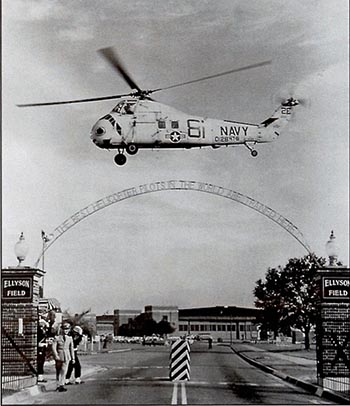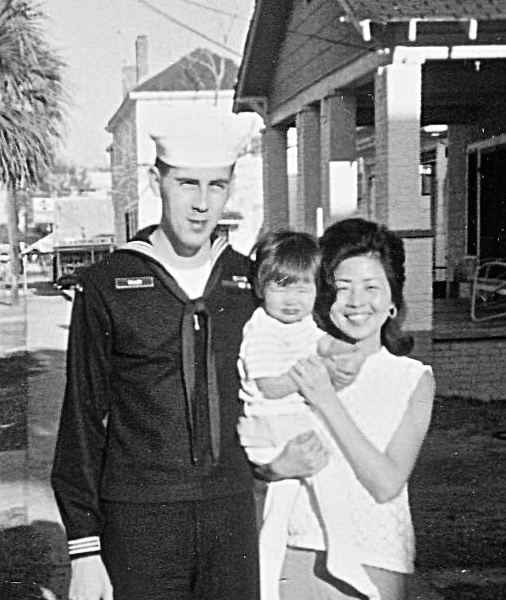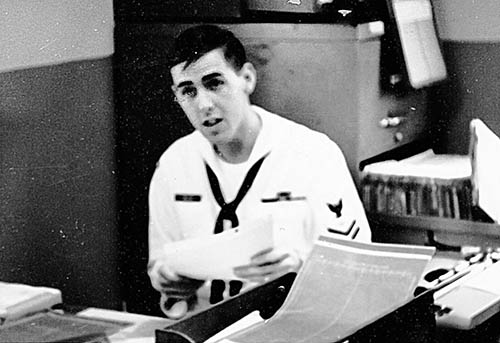 Download PDF of this full issue: v46n1.pdf (21 MB)
Download PDF of this full issue: v46n1.pdf (21 MB)From Vietnam Veterans Against the War, http://www.vvaw.org/veteran/article/?id=3235
 Download PDF of this full issue: v46n1.pdf (21 MB) Download PDF of this full issue: v46n1.pdf (21 MB) |
February 18, 1966, Subic Bay, Philippines: USS Ticonderoga (CVA-14) in port for one day before heading off to Japan for some time off-line. That is the day I was finally transferred from overseas duty after twelve months in Taiwan and twenty months on board the carrier. Even when the carrier was stateside, it counted as "overseas duty."

|
| Official photo of front gate to NAS Ellyson Field. |
By this time, the US now had nearly 400,000 troops in-country. Offshore naval forces had increased significantly. Where in late 1965 we had three carrier groups on station off Vietnam, we now had at least five. The 37-day bombing halt, LBJ's so-called "peace initiative," ended on January 31, 1966. The Vietnamese were being pounded day and night. It would only get worse.
I was now leaving the war zone, heading for my final duty station, shore duty with Helicopter Training Squadron Eight, based at Ellyson Field, Pensacola, Florida. It was exciting to realize that I would be able to live with my wife and daughter during these final two years with the Navy.
From Subic I had to take a military bus to Clark Air Force Base, about forty miles away. Once at Clark, I had to wait for a military transport flight. As I recall, I waited for a day or two, staying in a quonset hut. Finally, we flew out of Clark, stopping at either Wake or Guam for refueling, then on to Hawaii. In Hawaii, I transferred to a civilian flight that would take me to O'Hare Airport in Chicago. I still recall that welcome-home feeling as our flight passed over the West Coast.
Of course, home had changed significantly as well by the time I was coming back.
The Senate Foreign Relations Committee just completed three weeks of hearings on Vietnam. It was there that former diplomat George Kennan warned about the US "illusion of invincibility" in regards to Vietnam. While Secretary of State Dean Rusk continued his hawkish stance on the war. Dissent, even mild dissent, was presented by General James Gavin and others at these televised hearings. The American public was being challenged to THINK about the war, even though the majority polled denied it was a mistake at this time.
The civil rights struggle was also heating up and many were beginning to connect the war with the policies at home. The slogan of Black Power was gaining more saliency among younger activists for good reason. This movement was connected with and mirrored by the New Left as it challenged the old ways of doing politics. And, by 1966, something called the counterculture was thrown into the mix. Music and politics were now becoming inseparable. Mind-alteration with older and newer drugs (LSD was legal until 1966) was the way to escape.
This was all backdrop to my arrival at O'Hare Airport on a cold February morning. All I was thinking about right then was getting to my parents' home and seeing my wife and meeting my three-month-old daughter Lisa for the first time. They did not know when to expect me; it would be a surprise. And, it was.

|
|
Joe, Linda and Lisa outside their rental house in Pensacola. |
Tears and laughter were part of the reunion. I held my wife tightly; we had not seen each other since I left her the summer before, when she was four months pregnant. My daughter was beautiful, though she did not care to see me—I was the stranger. She was happier in her grandfather's arms at that moment. It took a little time for her to accept me in those first days back together.
I had nearly thirty days of leave before the three of us, Linda, Lisa and myself would need to get to Pensacola. It was great to be with family and friends again, to be away from the constant noise and the smell of carrier duty, to be away from the conflict in Southeast Asia. That was the physical part. Then, there was the mental thing.
My mother made the mistake of telling me that she would no longer have to think about me being in "that war." We were all sitting around the living room, and I reacted, perhaps too quickly. My being home did not mean the war was over. In fact, I said, it was getting worse. People were still fighting and dying. The war needed to end before Vietnam was totally destroyed. This was the strongest statement I had made to my family up to that point. We did not talk much about it for the remainder of my time at home. I had become a different person.
Around the third week in March, it was time for me and my new family to fly down to Pensacola. We found a comfortable and affordable apartment down near the shoreline and began to settle in.
When I finally reported for duty at Ellyson Field, I was assigned to work in the Personnel Office. One thing I did immediately was to turn my desk into a symbol of my feelings about the war. Under the glass top one would find quotations from anti-war Senators and photos of Vietnamese people trying to escape the war. One day the Senior Chief Petty Officer in charge of the office challenged me on this. I just told him I was a liberal on the war. He pointed out that I should not be too liberal. I was beyond the point of being too fearful to express my views.
The war had followed me home. I was now serving on a base that trained helicopter pilots for service in Vietnam. Many of the instructors were veterans of that conflict and would challenge my views on the war. Those views were becoming more and more solidified, the more I read and studied and paid attention to what was going on in the war and in our society. The war never left me.
At one point I decided to join the American Civil Liberties Union (ACLU) and became active in the local chapter. As anti-war voices inside the military became more visible, it seemed the smart thing to do. With a family to think of, I stayed within the bounds. I was now passing time until 1968, when I could get out of the service and join the anti-war movement in earnest.
Joe served in the US Navy from 1961 to 1968. Trained in Chinese at Army Language School in Monterey, served with Naval Security Group 1961 to 1964, crew member on board the USS Ticonderoga (CVA-14) 1964-1966. Discharged at NAS Ellyson Field, February 3, 1968. Currently a board member of VVAW, Inc.

|
| Navy journalist photo of Joe at work as Forms Control Yeoman in the base administration office. |